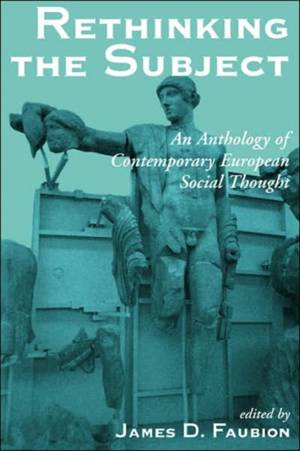
- Afhalen na 1 uur in een winkel met voorraad
- Gratis thuislevering in België vanaf € 30
- Ruim aanbod met 7 miljoen producten
- Afhalen na 1 uur in een winkel met voorraad
- Gratis thuislevering in België vanaf € 30
- Ruim aanbod met 7 miljoen producten
Zoeken
Rethinking The Subject
An Anthology Of Contemporary European Social Thought
James Faubion
Paperback | Engels
€ 79,45
+ 158 punten
Uitvoering
Omschrijving
Since the early seventies, European thinkers have departed notably from their predecessors in order to pursue analytical programs more thoroughly their own. Rethinking the Subject brings together in one volume some of the most influential writings of Foucault, Habermas, Bourdieu, Pizzorno, Macfarlane, and other authors whose ideas have had a worldwide influence in recent social theory. This anthology is testament to the central importance of three contemporary themes, each familiar to earlier thinkers but never definitively formulated or resolved. The first two concern the nature and modalities of power and legitimacy in society. The third, and most fundamental, deals with the nature and modalities of the "self" or "subject." These themes owe their special contemporary relevance to an array of events-- from the collapse of colonialism to the birth of test-tube babies. James Faubion's introduction traces the historical context of these influential events and themes. It also traces the lineaments of a still inchoate intellectual movement, of which the anthology's contributors are the vanguard. Whether "modernist" or "post-modernist," this movement leads away from a "world-constituting subject," which in one guise or another has served as the ontological ground of social reflection and research since Kant. It points instead toward ontological pluralism and toward polythetic diagnostics of heterogeneous forces that constitute a multiplicity of worlds and subjects.
Specificaties
Betrokkenen
- Auteur(s):
- Uitgeverij:
Inhoud
- Aantal bladzijden:
- 240
- Taal:
- Engels
Eigenschappen
- Productcode (EAN):
- 9780813315829
- Verschijningsdatum:
- 9/01/1995
- Uitvoering:
- Paperback
- Formaat:
- Trade paperback (VS)
- Afmetingen:
- 153 mm x 229 mm
- Gewicht:
- 362 g

Alleen bij Standaard Boekhandel
+ 158 punten op je klantenkaart van Standaard Boekhandel
Beoordelingen
We publiceren alleen reviews die voldoen aan de voorwaarden voor reviews. Bekijk onze voorwaarden voor reviews.











